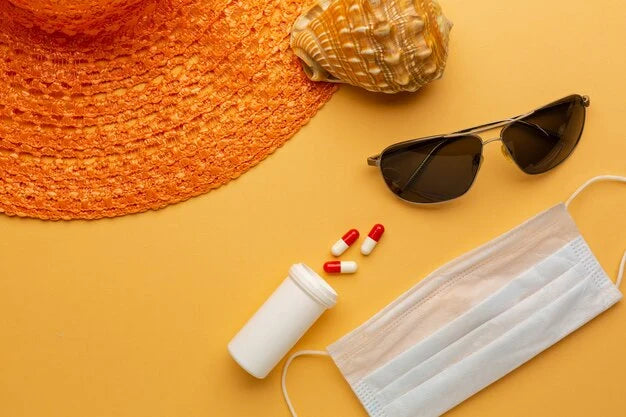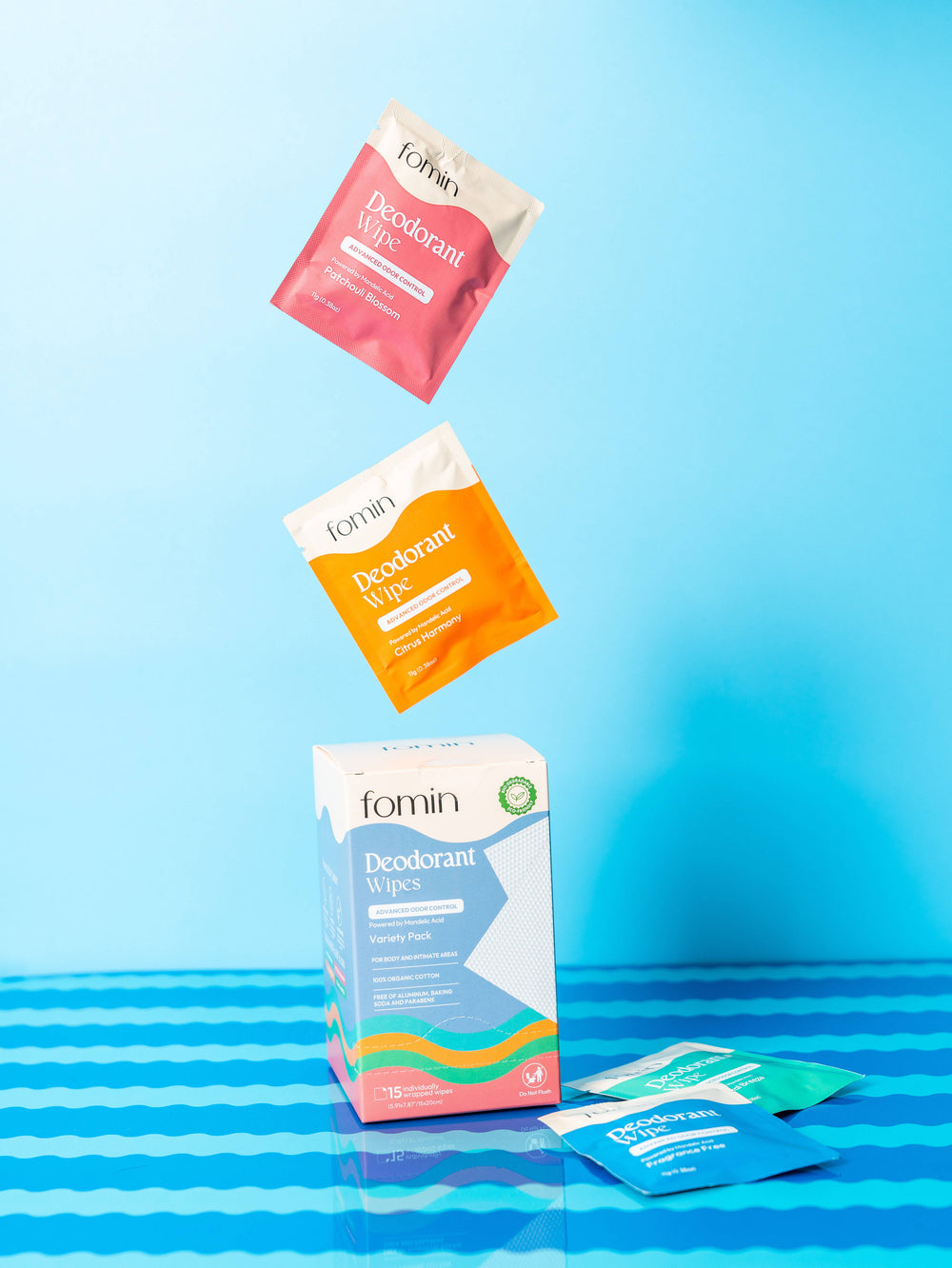
Antibiotics and Sun Exposure: How Are They Related
Share
Antibiotics are great for treating bacterial infections, however, they come with various side effects. These side effects are more prominent when it comes to sun exposure. So, discomfort associated with antibiotics and sun exposure is real.
In this article, we will see how antibiotics can increase the sensitivity towards sun exposure. Moreover, we will see the medications that cause heat intolerance.
What is Photosensitivity or Sun Sensitivity?
Photosensitivity is when skin becomes sensitive to sunlight or UV radiation. This can lead to burns, rashes, and other skin issues. Certain antibiotics cause photosensitivity, so individuals taking such drugs need to be cautious when spending time in the sun.
Photosensitivity reactions are divided into two categories.
Phototoxic Reactions
These reactions are direct and caused when a drug absorbs UV light and damages the skin directly. Symptoms include; redness, inflammation, and sometimes blistering.
Photoallergic Reactions
They are less common and cause allergic responses. Such reactions are generally delayed and appear 24-72 hours after sun exposure and can cause eczema-like rashes.

Antibiotics and Sunlight
Certain antibiotics can increase sun sensitivity. Side effects include severe sunburns, rashes, nausea, and dizziness. The list of sun sensitive medications that are known to cause sun damage are:
Doxycycline
This is a commonly prescribed antibiotic that increases sun sensitivity. It belongs to the tetracycline class of antibiotics which are known for causing phototoxic reactions. This medicine is used to treat various infections including respiratory infections, skin infections, and certain sexually transmitted infections.
However, sun exposure to doxycycline can cause sunburns and other skin infections. People taking doxycycline are often advised to avoid sun exposure. They are advised to wear protective prolonged clothing and apply a broad-spectrum sunscreen of SPF 30 or higher.
Besides doxycycline, several other antibiotics and medications can cause increased sensitivity to the sun. These include:
Tetracyclines
- Doxycycline
- Minocycline
- Tetracycline
Fluoroquinolones
- Ciprofloxacin
- Levofloxacin
- Ofloxacin
Sulfonamides
- Trimethoprim-sulfamethoxazole
- Sulfamethoxazole
Other Antibiotics
- Azithromycin (in some cases)
- Isoniazid (used to treat tuberculosis)
These are some of the antibiotics that increase the skin’s sensitivity to UV radiation. They can cause sunburns or rashes when combined with sunlight exposure. It is wise to take precautions if you are on any of these medications.
List of Sun-Sensitive Medications
Sun sensitivity is not limited to antibiotics. Other medications can cause photosensitive reactions. Some of the common categories and medications include:
Nonsteroidal Anti-Inflammatory Drugs (NSAIDs)
- Ibuprofen
- Naproxen
Diuretics
- Furosemide (Lasix)
- Hydrochlorothiazide
Antipsychotic Medications
- Chlorpromazine
- Thioridazine
Antiarrhythmics
- Amiodarone
- Quinidine
Retinoids
- Isotretinoin (commonly used for acne)
- Tretinoin
Antifungals
- Griseofulvin
These drugs react the same way as photosensitive antibiotics. They cause issues like redness, itching, and severe sunburn.
Medications That Cause Heat Intolerance
Some medicines also cause heat sensitivity apart from sun sensitivity. This happens when the body finds it difficult to regulate its temperature. These can cause issues like hot flashes, night sweats, overheating, and even heatstroke in extreme cases. Here is a brief list of medications that cause heat intolerance.
Anticholinergics
They are used for a variety of conditions including respiratory and bladder issues. Common ones are:
- Atropine
- Benztropine
Beta-Blockers
They are used for hypertension and heart conditions. Common ones are:
- Atenolol
- Metoprolol
Antihistamines
- Diphenhydramine
- Loratadine
Diuretics
- Hydrochlorothiazide
- Furosemide
Stimulants
They are often prescribed for ADHD. Common ones are:
- Amphetamine
- Methylphenidate
Certain Antidepressants
- SSRIs (like fluoxetine)
- Tricyclic antidepressants (like amitriptyline)
People on these medications need to take extra care in hot environments. They have to stay hydrated and avoid activities that can cause overheating.
Tips for Safe Sun Exposure While on Antibiotics
You can consider following precautions to manage sun sensitivity.
Use Sunscreen
Use a broad-spectrum sunscreen with SPF 30 or higher. Reapply every two hours or more often as necessary.
Use Eco-friendly Wipes
Keep Fomin eco-friendly wipes in your bag. They can provide you with mess-free hygiene and a refreshed feeling on the go.
Protective Clothing
Wear long-sleeved, lightweight clothing to shield your skin from the sun.
Avoid Peak Sun Hours
Limit your sun exposure between 10 a.m. and 4 p.m., when UV radiation is strongest.
Stay Hydrated
Drink plenty of water to stay hydrated.
Consult Your Doctor
In case you experience severe reactions and are unsure about the potential sun sensitivity of your medication, ask your physician for further guidance.
Conclusion
Antibiotics and sun exposure can have a complex relationship. Some antibiotics affect more compared to others. Understanding which medications increase sun sensitivity and taking steps to protect your skin can help prevent uncomfortable and potentially serious sunburns or rashes. Moreover, you can take the right precautions that help you enjoy your time in the sun while taking medications.
Building a Plastic-Free Future: Fomin's Commitment to Driving Sustainability
In an era where plastic pollution has become an alarming global issue, it is crucial to seek innovative solutions to reduce its devastating impact on our oceans and ecosystems.
Annually, an astounding 8 million metric tons of plastic waste goes into our oceans, endangering marine life and the sensitive equilibrium of biodiversity on Earth. Fomin, a pioneer in sustainable initiatives, has driven the movement toward a plastic-free planet.
By purchasing Fomin's eco-friendly cleaning products like dishwasher detergent tablet etc., you actively participate in the battle against plastic pollution. Join our loyalty program to participate in building a sustainable future - one where plastic is not a threat but a relic of the past.
FAQs
How can I manage medication-related overheating?
You should drink lots of water to stay hydrated, avoid peak sun hours, and consult your doctor in case you experience persistent medication-related overheating issues.
Should I stop taking a medication if it makes me too hot?
Yes, you should consult your doctor before continuing the medicine.



